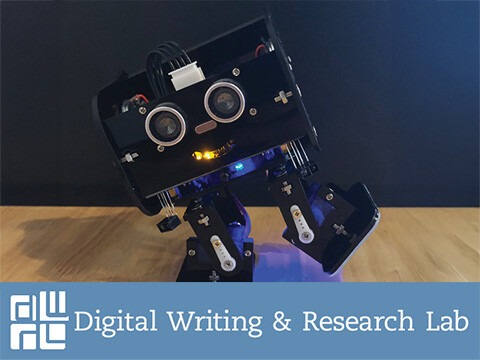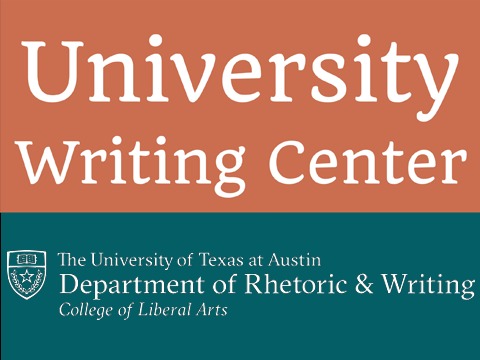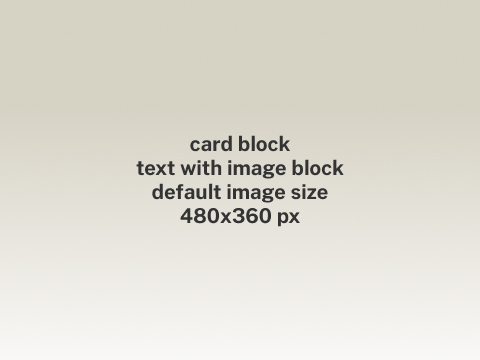Graduate Studies
Faculty in the Department of Rhetoric & Writing coordinate the Ph.D. in Rhetoric & Writing Studies. Questions about the program can be addressed to the graduate advisor: Dr. Scott Graham at ssg@utexas.edu. Details regarding admissions and application requirements are available here.
- Rhetoric
The Ph.D. concentration in Rhetoric in the English Department at the University of Texas at Austin is prestigious for good reason: we have an excellent placement rate; our alumni have become leaders of the discipline; our faculty are engaged, collegial, and productive; and we offer students a broad range of teaching and administrative opportunities.
The faculty, one of the most productive in the nation, has particular strength in the history of rhetoric, rhetorical theory, research methodology, composition, pedagogy, and digital technologies.
Seminars in rhetoric and writing focus on strands such as the history of rhetoric, rhetorical theory, research methodology, composition, pedagogy, and digital technologies, as illustrated in the list of previous course offerings. Students regularly supplement their coursework in English, with related courses in departments such as anthropology, classics, computer science, education, linguistics, philosophy, and speech communication.
In any given year, about 15 graduate students are pursuing degrees in the specialization. As illustrated by the profiles of previous students, students in Rhetoric and Writing write dissertations that
use a variety of methods (discourse analysis, field research, quantitative analysis, and textual analysis)
examine civic, pedagogical, professional, and political topics
investigate these topics from the perspectives of history, theory, and practice.
Students gain experience in planning and administering writing programs by teaching writing courses for the Department of Rhetoric and Writing (DRW) and as serving as consultants in the University Writing Center (UWC). Students with an interest in digital rhetorics teach in state-of-the-art networked-computer classrooms belonging to the Digital Writing and Research Lab (DWRL). Students may also apply to serve as assistant directors (ADs) of each of these units.
The Rhetoric concentration is closely associated with the concentration in Digital Literacies and Literatures (DLL). Students in both concentrations may focus their teaching and research in the DWRL, which has a long history of innovative research and development. The graduate students staffing the DWRL are introduced to lively conversations trending in the digital humanities and get hands-on training in a wide array of digital resources, including A/V equipment, multimedia software appropriate to the rhetoric classroom, content management systems, online pedagogical resources, and other digital tools.
The Rhetoric and Writing concentration has an excellent placement history. Our alumni are among the leaders of the discipline, deeply involved in scholarship, innovative teaching, and national policies on writing instruction.
Faculty
- Boyle, Casey
- Charney, Davida
- Davis, Diane
- Diab, Rasha
- Ferreira-Buckley, Linda
- Graham, Scott
- Hill, Annie
- Longaker, Mark
- Roberts-Miller, Trish
- Sackey, Donnie
- Spinuzzi, Clay
- Woods, Marjorie Curry
To view the faculty profiles, please visit the Rhetoric faculty listing.
- Digital Literacies and Literatures
Over the past few decades, digital technologies have reconfigured the possibilities for making, exploring, changing, and sharing the world. To be functionally literate in this age of constant updates and always on media, one must be able to do more than read the morning paper and write a letter to a state representative; one must be able to manage and synthesize multiple streams of multimodal information as well as find, produce, analyze, evaluate, and share information in various digital formats. While these demands require most citizens to keep up a continuous literacy practice, those perusing academic professions are compelled to double their efforts to productively contribute in an ever-changing media landscape.
In the Digital Literacies and Literatures concentration, students develop, research, and teach these twenty-first century literacies in practical, pedagogical, historical, and theoretical contexts, continually assessing the impact of the technologies they're using on the construction of their objects of study and the field of inquiry itself. Recent courses offered in this concentration have covered topics such as spatial rhetorics & locative media, networked writing, digital humanities, accessible rhetorics, extrahuman rhetorical relations, text ecologies, and performative rhetorics.
Recent and current dissertation projects in the DLL concentration focus on fan fiction and networked writing; networked hospitality; writing ecologies of food rhetorics; subjectivity and trigger warnings; irony and online education; online humor; networked subjectivity; parasitic digital communication; online shaming culture; and media archeology and forgetting.
In addition to fostering rich research environment, the DLL program affords students several opportunities to teach in state-of-the-art networked-computer classrooms and help staff the Digital Writing and Research Lab (DWRL). In the DWRL, students join lively conversations trending in the digital humanities and get hands-on training with a wide array of digital resources, including A/V equipment, multimedia software, content management systems, online pedagogical resources, and other digital tools for 21st academic research and pedagogy.
The placement record for DLL graduates is high. Recent graduates have gained Tenure-Track positions, for example, at Penn State, Texas Tech, Wayne State, Rutgers-Camden, UT-Rio Grand, St. Bonaventure, James Madison, West Virginia, Christopher Newport, Ohio University, UT-Tyler, Clemson University, and Middle Tennessee State University.
Faculty
- Boyle, Casey
- Charney, Davida
- Davis, Diane
- Graham, Scott
- Hinrichs, Lars
- Sackey, Donnie
- Spinuzzi, Clay
To view the faculty profiles, please visit the Digital Literarcies and Literatures faculty listing. Graduate students and faculty who are preparing for a field exam, please visit the Digital Literacies and Literatures Field Exam reading.
- Accordion 3Panel 3. Add body text in this space.
- Accordion 4Panel 4. Add body text in this space.
- Accordion 5Panel 5. Add body text in this space.
PhD in Rhetoric & Writing Studies
The PhD in Rhetoric & Writing Studies offers an innovative curriculum, research, and pre-professional training that prepares students to engage scholarly conversations about rhetorical theory from historical and global perspectives and to conduct empirical research using qualitative and quantitative methodologies. The PhD in Rhetoric & Writing Studies offers practical training in rhetoric and writing pedagogy and opportunities to apply rhetorical principles to nonacademic problems. Our faculty have diverse specialties in rhetorical history; digital rhetorics; feminist rhetorics; cultural rhetorics; technical communication; rhetorical theory; writing theory and pedagogy; queer rhetorics; public rhetorics; and rhetorics of science and technology. Training in this program will include core disciplinary and interdisciplinary perspectives for a multi-dimensional understanding of rhetoric and how it can be ethically applied to academic, practical, and community problems.
Job Placement
The PhD in Rhetoric & Writing Studies has an excellent job placement history. Our alumni are among the leaders of the discipline, deeply involved in scholarship, innovative teaching, and national policies on writing instruction. Recent graduates have gone on to work at Carnegie Mellon, Texas Tech University, Texas Women’s University, University of British Columbia, University of Kentucky, University of Queensland, and Meta (Facebook), Inc.
Funding
Funding for a full six years is available to all graduate students entering the Ph.D. Program. The 9-month TA stipend for the 2025-2026 academic year is $21,175. The 9-month AI stipend for the 2025-2026 academic year is $23,455. UT provides all eligible Academic Graduate Student employees with 100% premium support for AcademicBlue SHIP, the student health insurance plan. You can learn more about UT Academic Graduate Student Employee insurance options here.
Graduate students also have the opportunity to pursue additional graduate student employee positions at UT, including editorial assistantships, assistant directorships, and staffing in the University Writing Center (UWC) and Digital Writing and Research Lab (DWRL).
Department and Facilities
The DRW houses the Digital Writing and Research Lab (DWRL) and the University Writing Center (UWC), both of which offer unique training and employment opportunities for graduate students. Positioned at the intersection of rhetoric, writing, and technology, the DWRL was established in the 1980s and remains dedicated to the practice, teaching, and theory of the emerging digital literacies that are a requisite part of any 21st-century liberal arts education. The UWC, founded in 1993, offers a wealth of practical and pedagogical resources for graduate and undergraduate students, including in-person and online writing consultations. Additional facilities for graduate work include an excellent library system and the world-renowned Harry Ransom Center.

Photo Credit.
Digital Writing & Research Lab
The DWRL offers learning opportunities and support for students and faculty interested in a varied range of
digital practices, projects, and pedagogies.

Photo Credit.
University of Texas Libraries
With 17 locations and more than 10 million volumes, UT Libraries provide access to the latest journals, databases and web resources.
Learn More
Photo Credit.
University Writing Center
The University Writing Center is a supportive community designed to help writers generate and express their ideas effectively.
Learn More
Photo Credit.
The City of Austin
A world-class city with a vibrant, internationally renowned music, film, art, and taco scene.
Learn More
Photo Credit.

Photo Credit.

Photo Credit.

Photo Credit.

Photo Credit.

